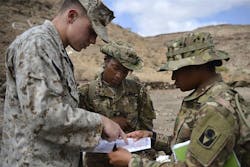Resilient positioning, navigation, and timing (PNT) technology aids military search and rescue
NATIONAL HARBOR, Md. – U.S. Army search and rescue experts needed radio communications equipment able to help find and rescue downed aircraft pilots in rugged terrain or behind enemy lines even without the Global Positioning System (GPS). They found their solution from McMurdo Inc. in Lanham, Md.
McMurdo, a subsidiary of Orolia USA Inc. in Rochester, N.Y., won a $33.9 million U.S. Army contract in March for personnel recovery devices that will be integrated into the Army's Personnel Recovery Support System (PRSS).
Orolia, a company that specializes in resilient positioning, navigation, and timing (PNT) announced the contract earlier this month at the Navy League of the United States Sea-Air-Space conference and trade show in National Harbor, Md.
McMurdo will provide a rugged, dual-mode, open, and secure beacon that enables individual warfighters to transmit distress signals, should they become isolated or missing, to support rescue operations. The award supports the Army's Air Warrior Product Management Office at Redstone Arsenal, Ala.
The Army award follows a 2016 Coast Guard contract for 16,000 of its handheld FastFind 220 personal locator beacons. The devices are used to contact rescue personnel in the event of land, water, or air emergencies.
McMurdo provides emergency position indicating radio beacons (EPIRBs) for naval and commercial ships that provide signal connectivity to rescue communications centers. The company builds roughly a quarter of emergency distress beacons in use worldwide.
The Army PRD and FastFind incorporates the Orolia resilient PNT technology, which can augment or serve as an alternative to satellite navigation like the Global Navigation Satellite System (GNSS).
Applications for Orolia's PNT devices and systems include network timing, maritime domain awareness, vessel monitoring, and command, control, communications, intelligence, surveillance, and reconnaissance, atomic clocks and low-noise oscillators for satellite communications, and guidance and navigation for unmanned systems.
Mark Cianciolo, vice president at Orolia, says that the GNSS-provided GPS is vulnerable to interference, spoofing, and jamming, and can be unavailable in urban "canyons" and other cluttered environments.
He says the company's resilient PNT capabilities provide alternative navigation or ALTNAV service through use of the Iridium satellite constellation, on station in low-earth orbit, at an altitude of about 500 miles.
The 24-satellite GPS constellation is in a high-Earth orbit (about 12,500 miles). He says that ALTNAV generates signals 1,000 times stronger than GPS, capable of "deep indoor" penetration and highly resistant to jamming and spoofing, and accurate to 30 to 50 meters.
Related: Three companies set sights on precision navigation that works independently of GPS
The company says that resilient PNT is the "convergence of traditional GNSS-provided position, navigation, and timing with STL capabilities for mission-critical PNT applications.
Orolia, through its McMurdo, SARBE, Spectracom, and Spectratime product brands, provides a resilient PNT capability to the services, government agencies, and to the maritime and aerospace industries.
The Navy, Cianciolo points out, depends on GPS and needs a redundant resilient PNT capability to operate in a GNSS/GPS-denied environment. The company's customers include all major Navy systems integrators, including Lockheed Martin, Raytheon, which use Orolia PNT devices in many of the Navy's mission-critical systems.
For more information contact McMurdo online at www.mcmurdogroup.com, Orolia at www.orolia.com, or the Navy League Sea Air Space event at www.seaairspace.org.
Ready to make a purchase? Search the Military & Aerospace Electronics Buyer's Guide for companies, new products, press releases, and videos

